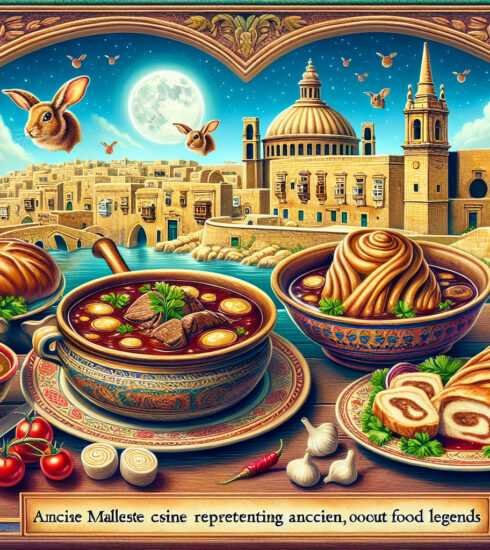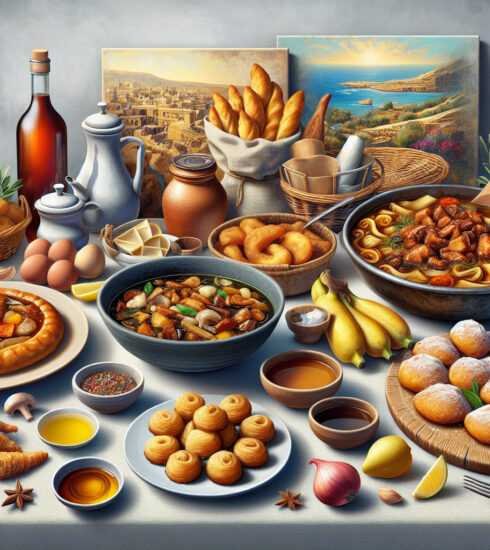Unveiling the Abundance of Maltese Culinary Treasures: Discover Unique Flavors in this Captivating Article!
Introduction
Malta, known for its rich history and stunning landscapes, is also a treasure trove of culinary delights. The small Mediterranean island has a unique cuisine that is influenced by a multitude of cultures, making it a culinary melting pot. In this article, we will delve into the abundance of Maltese culinary treasures, exploring the flavors, ingredients, and traditional dishes that make Maltese cuisine truly exceptional.
The Flavors of Malta
Maltese cuisine is a blend of Mediterranean, Middle Eastern, and North African flavors. The use of fresh, local ingredients such as fish, vegetables, fruits, and herbs is central to the Maltese culinary tradition. The flavors are bold and varied, with influences from neighboring countries such as Italy and Tunisia.
Fresh Seafood
As an island nation, it comes as no surprise that seafood plays a major role in Maltese cuisine. The waters surrounding Malta are teeming with a variety of fish, including grouper, sea bream, and tuna. Some popular seafood dishes include lampuki pie (fish pie), aljotta (fish soup), and grilled octopus.
Olives and Olive Oil
Olives and olive oil are staples in Maltese cooking. The island boasts its own unique variety of olives, known as Maltija, which are small and bursting with flavor. Olive oil is used in many traditional Maltese dishes, adding a fruity and robust taste.
Maltese Herbs and Spices
The use of fresh herbs and spices is fundamental in Maltese cuisine. Mint, thyme, oregano, and basil are commonly used to add depth and aroma to dishes. Among the spices, cinnamon, nutmeg, and cumin are popular choices, enhancing the flavors of stews, sauces, and marinades.
Honey and Honeycomb
Maltese honey is renowned for its unique flavor and high quality. Bees in Malta have access to a diverse range of flowers, resulting in a honey that is rich in floral notes. Honey is not only used as a sweetener but is also incorporated into traditional Maltese dishes, such as imqaret (date pastries).
Citrus Fruits

The sunny climate of Malta makes it the perfect environment for growing citrus fruits. Oranges, lemons, and grapefruits are abundant on the island, and their tangy flavors are often used in desserts and as a refreshing addition to salads.
Traditional Maltese Dishes
Maltese cuisine is characterized by hearty, rustic dishes that reflect the island’s history and culture. Here are some traditional Maltese dishes that you must try:
Rabbit Stew (Stuffat tal-Fenek)
Rabbit stew is considered the national dish of Malta. The tender rabbit meat is slow-cooked with onions, garlic, tomatoes, and a variety of herbs and spices, resulting in a flavorful and comforting dish.
Pastizzi
Pastizzi are a popular savory pastry in Malta. They consist of flaky pastry filled with either ricotta cheese or mushy peas. Pastizzi are a staple snack and can be found in bakeries and street food stalls all over the island.
Timpana
Timpana is a baked pasta dish that is akin to a Maltese version of lasagna. It consists of macaroni, Bolognese sauce, eggs, and a pastry crust. The dish is rich, flavorful, and incredibly satisfying.
Maltese Platter (Ġbejna u Bigilla)
The Maltese platter is a combination of two quintessential Maltese foods: ġbejna, a small round cheese made from goat’s or sheep’s milk, and bigilla, a traditional bean dip. The platter is often served with crusty bread and is a popular choice for a light lunch or as an appetizer.
Pudina Tal-Hobz
Pudina tal-hobz is a traditional Maltese bread pudding that is made using leftover bread, eggs, sugar, butter, and a medley of spices such as cinnamon and nutmeg. The pudding is moist, aromatic, and perfect for those with a sweet tooth.

Discovering Maltese Delights
To fully immerse yourself in the world of Maltese cuisine, there are several culinary experiences you can partake in:
Cooking Classes
Joining a cooking class is a fantastic way to learn about Maltese cuisine firsthand. You’ll have the opportunity to learn traditional recipes, try your hand at cooking techniques, and savor the flavors of your creations. Check out Maltese Flavors for a selection of cooking classes in Malta.
Food Tours
Embark on a food tour and explore the culinary gems of Malta. A knowledgeable guide will take you to local markets, specialty shops, and hidden restaurants, allowing you to sample traditional dishes and discover unique ingredients. Maltese Cuisine offers a variety of guided food tours that will tantalize your taste buds.
Festivals and Events
Attend culinary festivals and events to experience the vibrancy of Maltese cuisine. The yearly Malta International Food Festival showcases the best of local and international cuisine, featuring a wide array of food stalls and live cooking demonstrations.
The Future of Maltese Cuisine
Maltese cuisine, with its rich history and unique flavors, is undergoing a renaissance. Chefs are increasingly drawing inspiration from traditional recipes and local ingredients, while also embracing modern culinary techniques and innovations.
The farm-to-table movement is gaining momentum, with more restaurants and cafes sourcing their ingredients locally. Sustainable practices and organic farming methods are becoming a priority, ensuring that the flavors of Maltese cuisine are not only delicious but also environmentally friendly.
The fusion of different flavors and ingredients is also becoming more prevalent in Maltese cooking. Chefs are experimenting with new combinations, creating innovative dishes that marry the traditional with the contemporary.
Conclusion
Maltese cuisine is a true delight for food lovers. The eclectic flavors, fresh ingredients, and traditional dishes make it a culinary destination like no other. Whether you’re a seafood aficionado or have a sweet tooth, there’s something to tantalize every palate. So come and experience the abundance of Maltese culinary treasures for yourself.






